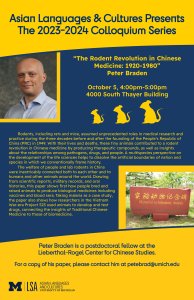Presented By: Asian Languages and Cultures
Asian Languages and Cultures 2023-2024 Colloquium Series
“The Rodent Revolution in Chinese Medicine: 1920-1980” Peter Braden

Rodents, including rats and mice, assumed unprecedented roles in medical research and practice during the three decades before and after the founding of the People’s Republic of China (PRC) in 1949. With their lives and deaths, these tiny animals contributed to a rodent revolution in Chinese medicine by producing therapeutic compounds, as well as insights about the relationships among pathogens, drugs, and people. A multispecies perspective on the development of the life sciences helps to dissolve the artificial boundaries of nation and species in which we conventionally frame history.
The welfare of people and lab rodents in China were inextricably connected both to each other and to humans and other animals around the world. Drawing from scientific reports, military records, and oral histories, this paper shows first how people bred and raised animals to produce biological medicines including vaccines and blood sera. Taking malaria as a case study, the paper also shows how researchers in the Vietnam War-era Project 523 used animals to develop and test drugs, connecting the insights of Traditional Chinese Medicine to those of biomedicine.
The welfare of people and lab rodents in China were inextricably connected both to each other and to humans and other animals around the world. Drawing from scientific reports, military records, and oral histories, this paper shows first how people bred and raised animals to produce biological medicines including vaccines and blood sera. Taking malaria as a case study, the paper also shows how researchers in the Vietnam War-era Project 523 used animals to develop and test drugs, connecting the insights of Traditional Chinese Medicine to those of biomedicine.